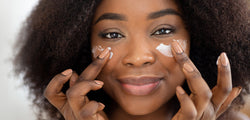
The Difference Between Cream, Ointment, Lotion, Moisturizer and Gel
Table of Contents:
In a world that is populated by a gazillion of salves, it can be confusing to tell the difference between cream and ointment especially if you are relatively new to the world of cosmetics. But is there really any difference between ointment and cream as far as skincare goes? Aren't they all just a bunch of lotions or gels? It is, nonetheless, not as simple and neither is it as straightforward as it may seem on paper. Read on to find out what exactly you should be using on your skin in the ointment vs cream vs lotion showdown.
What's the Difference Between Cream, Ointment, Lotion and Moisturizer?
There's no denying that many people often struggle to tell the difference between ointment vs cream vs lotion. So, fret not if you happen to be one of them. If anything, they are not that hard to tell apart, especially if you happen to have some idea about the basic distinction in the lotion vs cream vs ointment debate. What's more, based on your skin type, you may want to know between moisturizer vs cream which is best suited for you. And as much as one may argue that the ointment vs cream vs lotion discourse is a never-ending one, it is imperative to bear in mind that each of these is a topical product at the end of the day.
In case you are wondering, creams tend to have a better absorption rate when directly compared to ointments. They are also water-based and come in lighter textures. And this explains why when one applies a cream to their skin, the water in the formulation emulsion usually evaporates leaving behind a thin layer or active ingredients and oil on their skin.

Lotion vs Moisturizer vs Gel: How Can One Tell Them Apart?
Even before delving deeper into the difference between moisturizer and lotion, it is important to know what a gel is in the first place. You see, gels are a water-based version of lotions. In other words, these are oil-free emollients that are capable of being absorbed faster by the skin. Texture-wise, you can tell the difference between lotion and moisturizer through the observation that moisturizers and gels are light to the point that you may not even feel them on your skin. And because of that, moisturizers and gels often come in handy in the hotter months of the year.
In light of these hydration abilities, it is easy to see why the lotion vs gel debate is not about to end any time soon. For starters, unlike standard lotions, a well-formulated gel such as Maryann Hydro Care Cream is usually capable of providing a matte effect when slathered on without necessarily looking greasy or shining in the sun.

That said, gels are typically best adopted for oily skin as they contain hyaluronic acid which is perfect for capturing water molecules nestled in the epidermis consequently avoiding a greasy sheen.
Gel vs Cream vs Ointment
The biggest difference between gel and cream is best summarized by the fact that creams are ordinarily white and tend to have a thicker consistency or texture than gels. What's more, they tend to take more time to absorb or coalesce. This long-time absorption also implies that they tend to create a long-lasting and protective layer between your skin and the immediate outside environment. This is actually the biggest difference between cream and gel as far as texture goes.
That said, the biggest distinction in the gel vs cream moisturizer debacle is the fact that while creams can be water-based, they tend to contain fat and oils unlike gels. Also, creams are generally applied fewer times a day and users have observed that they are generally more effective when applied at night or in the evenings. We would, for instance, recommend that you use a cream like Maryann's Collagen Cream during the colder months of the year as it is more effective than the standard gel especially for sensitive or dry skin types.

Now that we are discussing ointment vs cream topical medications, it is helpful to point out that ointments generally have a distinct semi solid paraffin-based and thick texture. They are not only very greasy but also non-porous, very greasy and almost impervious to elements. Which, of course, explains why they create a strong film on one's skin. Nonetheless, they tend to have a longer absorption time than regular creams. And thanks to its longer-lasting effects, ointments are usually used majorly for medicinal purposes rather than purely cosmetic reasons.
So, Which One Should I Use?
When deliberating about what to use between lotion vs moisturizer, it is often common for folks to forget the precise reason moisturizers were invented in the first place. You see, as much as lotions are generally applied at dawn before heading out, moisturizers can come in handy at dusk. This way, your skin can repair a large chunk of the damage sustained during the day.
What's even better, some of the little-known advantages of using a moisturizer include;
- Moisturizers are excellent at preventing flaking
- They have very superior anti-aging effects compared to standard lotions. For instance, dermatologists will often encourage you to moisturize your ear, face, chest, arms and neck to keep them looking taut and younger as you cruise through life.
- Moisturizers are excellent hydration agents; you should not skimp on a moisturizer if your skin feels tired and dry
- They are capable of reducing the conspicuousness of wrinkles
In addition, your skin type matters when deciding between lotion vs cream vs ointment. Here's the thing; there are three main types of skin types
- Dehydrated or dry skin
- Oily skin
- Normal or combination skin

Generally, a dermatologist will advise you to get a good cream like Maryann's Retinol Moisturizing Cream if you have dehydrated or dry skin. Gels are, on the other hand, best reserved for keeping oily complexions looking great without necessarily having a greasy sheen. Still, it is almost impossible not to notice that gels have been getting increasingly popular over the last couple of years among a sizable chunk of the population. Reason being, gels are more than capable of providing the same internal protective solution offered by creams and lotions. The only difference is that the hydration is typically activated within your skin's architecture which implies that no greasy side effects are left behind.
To summarize, here is a quick guide on what you should be looking based on your skin type
- If you have oily skin: Go for gels. This Hydro Boost Water Gel from Maryann is a pragmatic example of what anyone with predominantly oily skin should be looking at, particularly considering that their skin is often well-endowed with natural oils.
- Those with normal or combination skin: They are lucky enough to have the luxury of choice depending on what they need at that particular instance. If you want a superlight hydrator, for example, you should go for a gel while if you need a moisturizer then settling for a moisturizing cream should not be a bad idea either.
- Dry skin: Those with dry skin should have creams in their radar. Nevertheless, it does not necessarily mean that they can't use gels - only that it is recommended that they should apply the gel first to let it infuse in the skin first before topping it up with a capable moisturizing cream afterwards.
Product Highlights
| Consistency | Ideal or best uses scenario | |
| Lotion | Non-greasy and thin | Needed for rapid absorption which does not leave behind an unwanted residue |
| Cream | Viscous, holds shape, non-greasy | Best for dry skin, arresting skin lesions, rashes and protecting against hydration or moisture loss |
| Ointment | Greasy, viscous and thick | Ointment are mostly topical medications and often require maximum product absorption |
| Gel | Non-greasy and thick | Extremely oily or normal skin |
In Conclusion
The difference between cream, ointment, lotion, moisturizer and gel can be cosmetic or medicinal depending on how you choose to look at it. Nevertheless, the main distinction between each of these often comes down to the ratio between water and oil. While creams, moisturizers and gels tend to be largely water-based, ointments and lotions are majorly oil-based. Either way, your skin type and condition should typically dictate what to use at the end of the day.













